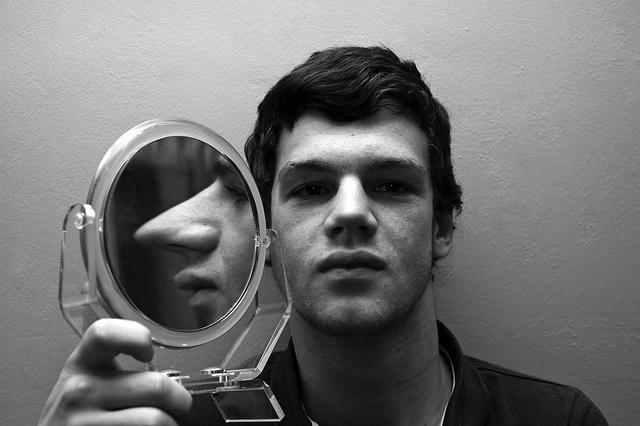“I wish I could show you, when you are in light or in darkness, the astonishing light of your own being” ~ Hafiz
You may suspect that you have low self-esteem, but you probably have no idea what to do about it!
Most articles about self-esteem talk about thinking positively, making affirmations, smiling a lot, etc. These things are just band-aids – they will only serve to suppress the truth about how you feel about yourself for a short time. I am not interested in band-aids. I am interested in prevention and cure…
In this post I’m going to tell you what self-esteem is really all about; how it is negatively affected; why I think it’s hugely important that we do do something about it – and what to do.
What is self-esteem?
(other than a term that is much used and little understood)
My definition of self-esteem is 5 words:
~ ‘how deeply you love yourself’ ~
So, how deeply do you love yourself?!
(Don’t worry, I’ll help you answer that question quite accurately in just a moment)…
I believe this is perhaps one of the most important questions you will ever ask, and here’s why: the extent to which you love yourself dictates how successful you are in every area of your life – relationships, work, and health (emotional, physical, mental, and spiritual health).
I have a nice way of answering the above question. It is called The Mirror Exercise*, and there are 3 simple steps:
1. Look yourself in the eye in a mirror.
2. Tell yourself sincerely: “I love you”.
3. See how it feels, and measure the feeling out of 10 (see below).
If your self-esteem is intact (if you do indeed love yourself deeply) then the exercise should be fun!
However, for most people there is at least some difficulty – as they say the words there is a feeling of stress. This is because human beings are hardwired not to lie. So if you have low self-esteem (you don’t love yourself), telling yourself “I love you” feels like a lie – it feels stressful.
Lie detector machines (polygraph machines) work by detecting the biological symptoms of stress. But you don’t need a polygraph machine – you know when you are lying, because you feel the stress. That’s why this exercise is really quite an accurate (although not scientific) indication of how high your self-esteem is.
So the mirror exercise is to do the above 3 steps. The final step, measuring the feeling of stress on a scale of 0 – 10, works like this:
10/10 stress: as you say the words you probably feel quite uncomfortable, and you just don’t believe it at all. This means that you have very low self-esteem.
0/10 stress: no stress, therefore high self esteem.
Go ahead and do it now..
~ (I’ll wait right here) ~
So, if you just did the exercise, you probably felt at least a little discomfort or stress as you said those 3 words. Here’s why:
We should love ourselves completely. Human beings are Loving beings. The essence of the human experience is love itself. Your essence is love.
In Yogic terms this is known as Satchitananda: pure existence, pure consciousness, pure bliss. In a word – love.
But almost all of us suffer the consequences of unresolved trauma – usually much more than we realize.
Childhood trauma…
Birth trauma…
Trauma experienced by our Mother whilst we were ‘in utero’…
Not to mention ancestral trauma: the emerging branch of science called Epigenetics has demonstrated conclusively that trauma from the lives of our ancestors – especially trauma from the time when our egg was created in the ovary of our Mother (when she was a fetus in the uterus of her Mother*) – directly impacts on our life, even our genetic predispositions and biological constitution!
The kind of trauma that affects self-esteem the most is abuse trauma. And if you think that abuse is probably something that happens to a minority of those ‘other’ people, think again! There are perhaps as many as 99 different kinds of abuse, ranging from the more obvious (sexual) to the very subtle (emotional neglect). And abuse (defined here as a violation of one’s boundaries) is entirely subjective…
Some of the consequences of abuse are that we feel guilty, ashamed, and responsible for what happened. Essentially, we feel that there is something wrong with us – and if there is something wrong with us, we have a very good reason to love ourselves less, right?
Our self-esteem suffers.
My theory is that abuse trauma is the cause of most of mankind’s problems. Not long after establishing this theory, something happened that blew my mind. I was sitting at my desk, thinking and writing about this theory when someone sent me a link to a book:
“The Origins of War in Child Abuse” by Lloyd Demause.
So I realized that other people were also coming to the very same conclusions as I was. And I don’t believe in ‘co-incidence’.
The purpose of this post is not to explain the mechanism of trauma and abuse in detail. If you’re interested to know more about that check back later, because I’ll be posting articles about it soon. Right now though I want to stay focused on self-esteem. And what I want to communicate is this:
1. Most people don’t love themselves nearly enough.
2. This low self-esteem causes many, many problems, both on the personal level, and globally (think war, corruption, and environmental destruction).
3. It’s not so hard to fix the problem on the personal level (thus directly and powerfully influencing the global).
When is your self-esteem determined?
“To love oneself is the beginning of a lifelong romance” ~ Oscar Wilde
If you go through a painful divorce after 20 years of marriage, can that affect your self-esteem? I don’t think so: I think that the experience will simply expose your underlying low self-esteem (that was always there even while you were married). I believe that our self-esteem is set in childhood, perhaps up until the age of around 21 years old. Early trauma (at birth and pre-school) is probably the most impactful on how much we love ourselves.
However, another theory (which does not necessarily negate the childhood theory, but may just be another perspective on it) is that we inherit our self-esteem. After all, the trauma that we experience in our lifetime is usually an echo of similar trauma that our ancestors experienced. So it could be that we inherit poor self-esteem, and then attract experiences that reinforce it (such as divorce), and perpetuate the pattern.
Either way, it does not really matter. Two things are important in this – being able to recognize the effect of the trauma (as opposed to the actual trauma itself, which is far less relevant), and being able to heal those consequences.
With modern healing techniques like Reference Point Therapy, which are simple, fast, and highly effective, we are able to pinpoint the exact consequence of the trauma (which is usually a subconscious association between one of our survival instincts, and safety), and heal it (release the subconscious association).
The effect of this kind of healing is a subtle change in all aspects of one’s life. Relationships, feelings, emotional reactions, and even the physical structure of the body (posture, lung capacity, etc) are transformed.
And the beautiful thing is that the change is not a particular change, but a wave of change – it is an ongoing process, namely, of us coming back to our true selves: love.
The analogy I use is this: if you have walked for a long time with a stone in your shoe, it will eventually affect every area of your life – your posture, your emotions, your deeper feelings, your sense of self-identity (ego), even the expression on your face!
But when you remove the stone, all of these changes do not instantly disappear – it takes time for each aspect of you to settle back to normal, and even the expression on your face will gradually, over time, relax.
Similarly, when releasing subconscious blockages, the effects may be felt instantly, but are always ongoing…
How do you raise your self-esteem?
“You can’t build joy on a feeling of self-loathing.” ~ Ram Dass
As with anything else, you solve a problem permanently only by changing what caused the problem.
In this case, low self-esteem is caused by the consequences of unresolved trauma. When you heal the trauma, you instantly begin to love yourself more.
I wish I could tell you in a short blog post how to heal trauma yourself, but it’s not quite as simple as that – it takes a number of days of intensive training to be able to safely find the blockages, identify their roots, and heal them. It’s quite simple really – you don’t need a degree, but you do need proper training.
I hope though that this post sheds some light on something that I believe to be the key to a more sustainable, compassionate, and peaceful human society: how much we love ourselves as individuals.
Participate in a simple social experiment?
“The privilege of a lifetime is being who you are.” ~ Joseph Campbell
I would like to propose what could be a useful social experiment: when you do the mirror exercise post the ‘score’ (out of 10) as a comment below (along with the feelings that came up too, if you like). It only takes a moment to do this, and may be done anonymously, and if this article gets 1000 reads, and 5% of people participate that’s 50 people – a reasonable number of results to compare and analyze . The results will either support or undermine my theory that most of us suffer from low self-esteem, and either way, it’ll be interesting! If you also write a little about what feelings came up as you did the exercise, I will do my best to answer your comment in a helpful way.
And share it up folks – spread the love, as always. Thank you!
* Biology lesson: a woman’s eggs are all produced long before she is born. They are formed in the ovaries at around the time of 3 months gestation in the womb of her own mother.
Bonus: click here for a fascinating and entertaining documentary about epigenetics.
I believe I first discovered The Mirror Exercise in a book, but I have no recollection of which book. So please, if you have ever come across this technique before, let me know so that I can properly give credit to it’s creator? Thank you!
Image: Flickr







Read 114 comments and reply